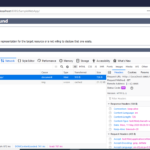How to Configure OpenAM Data Store Decision Node Tree In this article, we will discuss How to Configure OpenAM Data Store Decision Node Tree. OpenAM having a different type of authentication mechanism to achieve the authentication process. In which one of the mechanisms is Tree. The tree is the combination of different types of nodes. […]
Month: May 2020
Cross-Site Request Forgery Vulnerabilities OWASP
Cross-Site Request Forgery Vulnerabilities OWASP Cross-Site Request Forgery(CSRF) is one of the top 10 security vulnerabilities with high risk. It allows a hacker to perform an action on the vulnerable site on behalf of the victim(user). If the site does not validate the original request properly then the attack is possible. Attacker forges the […]
Sensitive Parameters are Susceptible to Brute force Attacks OWASP
Sensitive Parameters are Susceptible to Brute force Attacks OWASP Sensitive parameters such as username, password, server IP, etc.. will be guessed by the attacker by trying a large combination of attempts. Those parameters are susceptible to Brute Force Attack, it is a one of OWASP vulnerability with medium risk. We should avoid the attacker guessing […]
Apache Tomcat Server Information Disclosure by Verbose OWASP
Apache Tomcat Server Information Disclosure by Verbose – OWASP By default, Apache Tomcat server information exposed and leads security issues. It’s one of the OWASP vulnerabilities with low risk. Apache Tomcat server information disclosed in two places such as response header and error screen in the lower version. In the higher version of the tomcat […]
Information Disclosure by Test, Old and Backup Files OWASP
Information Disclosure by Test, Old and Backup Files OWASP Information disclosure by test, old and backup files that are not required for the application. This is one of the security vulnerability with info risk. We need to remove the unwanted test files. old files and backup files. Backup files and test files keep outside fo […]
Unauthorized File Upload Vulnerabilities OWASP
Unauthorized File Upload Vulnerabilities OWASP The application should allow the only specific types of files according to the requirement. And we should not allow unauthorized files into the application. It is possible for an attacker to bypass the current restrictions in place and upload an executable application or script. Bypassing the executable file, attackers can […]
How to configure Gmail in Thunderbird and Outlook
How to configure Gmail in Thunderbird and Outlook In this article, I will show you How to configure Gmail in Thunderbird and Outlook. Gmail not having own mail client so we can configure Gmail account in third party mail clients i.e Thunderbird, Microsoft Outlook, etc… Gmail Server Details To configure Gmail Account in Thunderbird […]






